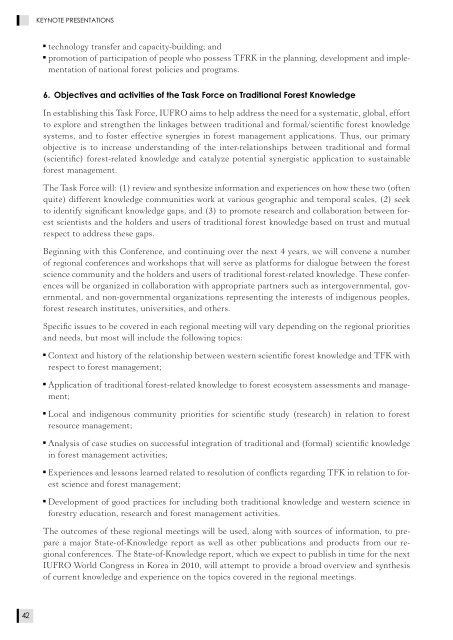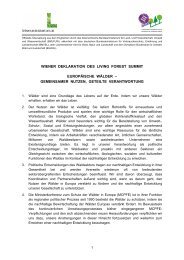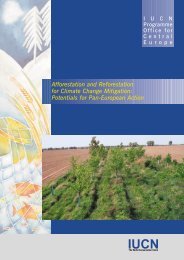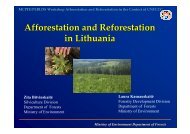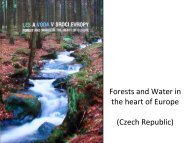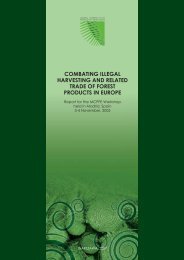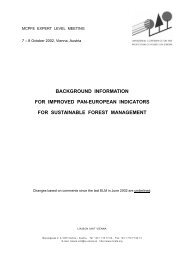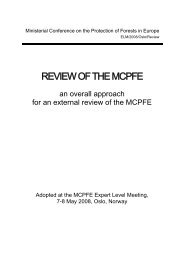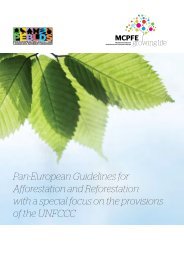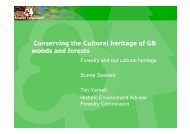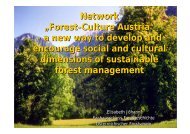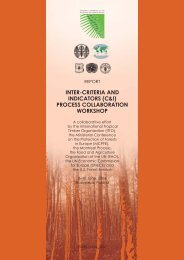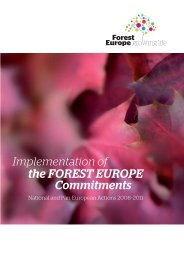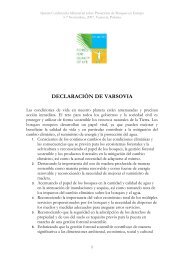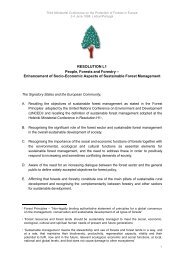Volume 1 - Forest Europe
Volume 1 - Forest Europe
Volume 1 - Forest Europe
Create successful ePaper yourself
Turn your PDF publications into a flip-book with our unique Google optimized e-Paper software.
42<br />
KEYNOTE PRESENTATIONS<br />
technology transfer and capacity-building; and<br />
promotion of participation of people who possess TFRK in the planning, development and implementation<br />
of national forest policies and programs.<br />
6. Objectives and activities of the Task Force on Traditional <strong>Forest</strong> Knowledge<br />
In establishing this Task Force, IUFRO aims to help address the need for a systematic, global, effort<br />
to explore and strengthen the linkages between traditional and formal/scientifi c forest knowledge<br />
systems, and to foster effective synergies in forest management applications. Thus, our primary<br />
objective is to increase understanding of the inter-relationships between traditional and formal<br />
(scientifi c) forest-related knowledge and catalyze potential synergistic application to sustainable<br />
forest management.<br />
The Task Force will: (1) review and synthesize information and experiences on how these two (often<br />
quite) different knowledge communities work at various geographic and temporal scales, (2) seek<br />
to identify signifi cant knowledge gaps, and (3) to promote research and collaboration between forest<br />
scientists and the holders and users of traditional forest knowledge based on trust and mutual<br />
respect to address these gaps.<br />
Beginning with this Conference, and continuing over the next 4 years, we will convene a number<br />
of regional conferences and workshops that will serve as platforms for dialogue between the forest<br />
science community and the holders and users of traditional forest-related knowledge. These conferences<br />
will be organized in collaboration with appropriate partners such as intergovernmental, governmental,<br />
and non-governmental organizations representing the interests of indigenous peoples,<br />
forest research institutes, universities, and others.<br />
Specifi c issues to be covered in each regional meeting will vary depending on the regional priorities<br />
and needs, but most will include the following topics:<br />
Context and history of the relationship between western scientifi c forest knowledge and TFK with<br />
respect to forest management;<br />
Application of traditional forest-related knowledge to forest ecosystem assessments and management;<br />
Local and indigenous community priorities for scientifi c study (research) in relation to forest<br />
resource management;<br />
Analysis of case studies on successful integration of traditional and (formal) scientifi c knowledge<br />
in forest management activities;<br />
Experiences and lessons learned related to resolution of confl icts regarding TFK in relation to forest<br />
science and forest management;<br />
Development of good practices for including both traditional knowledge and western science in<br />
forestry education, research and forest management activities.<br />
The outcomes of these regional meetings will be used, along with sources of information, to prepare<br />
a major State-of-Knowledge report as well as other publications and products from our regional<br />
conferences. The State-of-Knowledge report, which we expect to publish in time for the next<br />
IUFRO World Congress in Korea in 2010, will attempt to provide a broad overview and synthesis<br />
of current knowledge and experience on the topics covered in the regional meetings.


